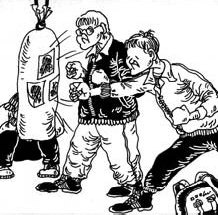
A middle school in Jinan, capital of Shandong province, set up an "emotion venting room" recently, placing punching bags that students could hit to vent their feelings of anger, resentment, frustration and depression. On the bags were painted faces of the school's headmaster and other officials.
I understand why the teachers did so and admire their courage to take such great pains to educate the kids. But the practice has left me worried, too, because I'm not sure about its consequences. The students will undoubtedly feel relieved from the pressure or frustration created by the tough study schedule and their teachers' stern criticism. It, however, seems the side effects of such a practice would be greater than the benefits.
What did the kids have in mind when they punched the teachers' images? Weren't they pleased to vent their anger and frustration on their teachers? In fact, the kids did think so. According to a media report, the students uttered words such as "this punch is to punish you for your bad remarks" and "you need a hard blow to remember not to be harsh on me again" as they hit the punching bags.
Another unwelcome result of the punching bags is that it could encourage students to be disrespectful toward their teachers. If the portrait of a teacher becomes a target of violence, how can you expect students to respect him or her?
Respect for teachers has been an integral part of Chinese culture. This tradition has played an important role in advancing Chinese civilization. But nowadays more and more students and parents seem to disregard this practice. Several factors could have led students and parents to be less respectful toward teachers. The improper behavior of some teachers and changes in social values are just two of them. But there's no denying that undue emphasis on students' independent thinking in challenging teachers' authority has played a big part in the loss of respect for teachers.

In recent years, educators have been campaigning for "protecting students' right" against corporal punishment. This is welcome. But things seem to be going to the other extreme. There have been more and more reports of students defiantly quarrelling with, and even insulting, teachers in class.
The most tragic incident took place in a Chongqing vocational school in June 2007.
A 30-year-old woman teacher died of anger-induced heart attack after a student insulted her by calling her names because she had tried to stop him from playing cards in class.
A few days earlier, a case of students humiliating a teacher was reported from Beijing. A student yanked off the hat of a 70-year-old teacher, while another threw an empty bottle at him in class. What hurt us more is the fact that none of the other students protested against the insult to the teacher. Instead, they encouraged the two to go on.
The two incidents are not isolated cases. In thousands of online comments, many netizens have said that teachers now don't dare to criticize students. There have also been reports of parents rushing to schools to beat up teachers after their children complained against them because they tried to instill discipline in class. Such incidents may not be common across the country but the problem seems serious.
Reforming our traditional education philosophy to grant students more freedom in class would help them think independently and become more creative. But that does not mean they should be allowed to do whatever they like, let alone encourage them to confront teachers in hostile manners. Kids have to be taught and guided. Let us not misguide them by teaching them to disrespect teachers and vent their frustration through violence.
E-mail: liushinan@hotmail.com
About the author:
劉式南 高級編輯。1968年畢業于武漢華中師范學院(現華中師范大學)英文系。1982年畢業于北京體育學院(現北京體育大學)研究生院體育情報專業。1982年進入中國日報社,先后擔任體育記者、時政記者、國際新聞編輯、要聞版責任編輯、發稿部主任、《上海英文星報》總編輯、《中國商業周刊》總編輯等職。現任《中國日報》總編輯助理及專欄作家。1997年獲國務院“特殊貢獻專家政府津貼”。2000年被中華全國新聞工作者協會授予“全國百佳新聞工作者”稱號。2006年獲中國新聞獎二等獎(編輯)。
